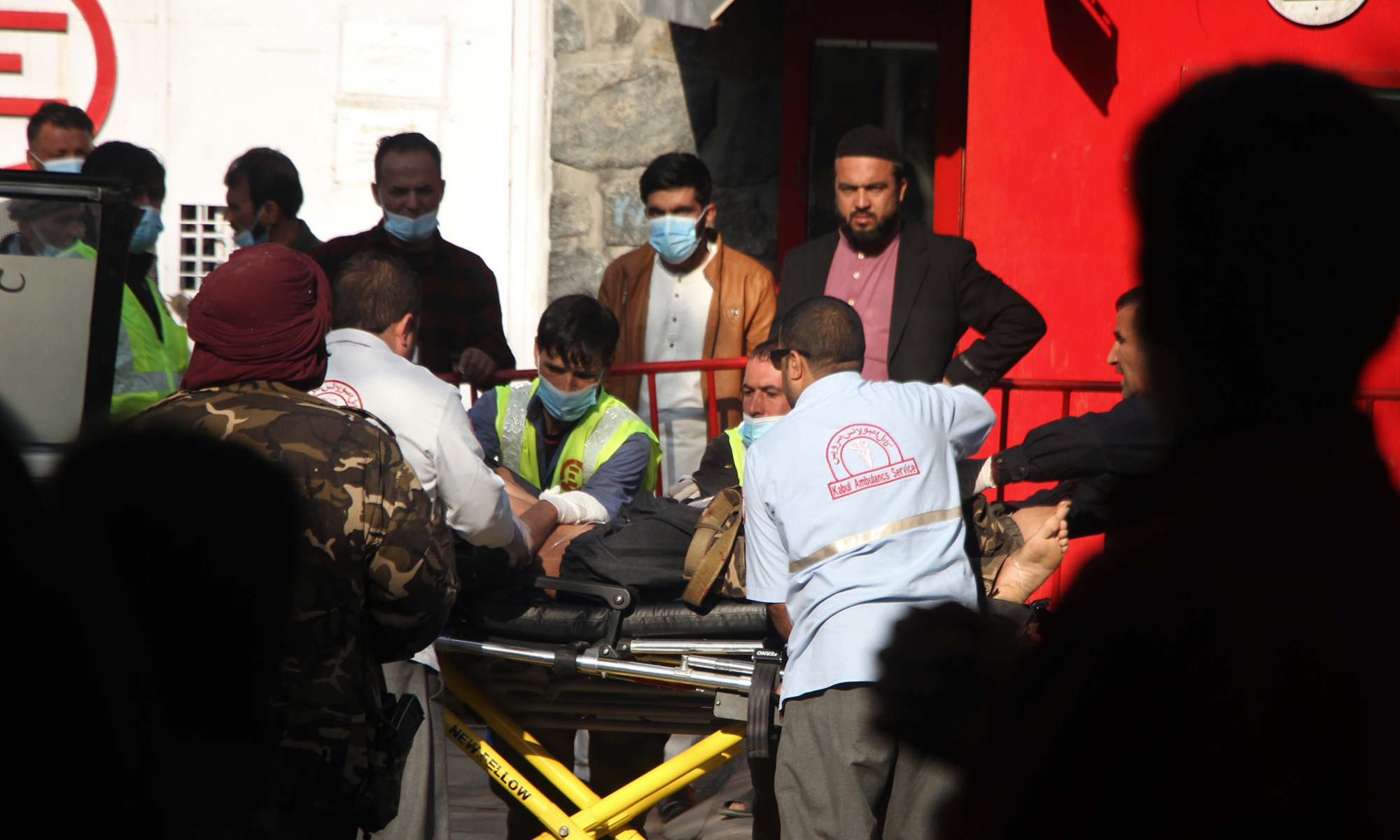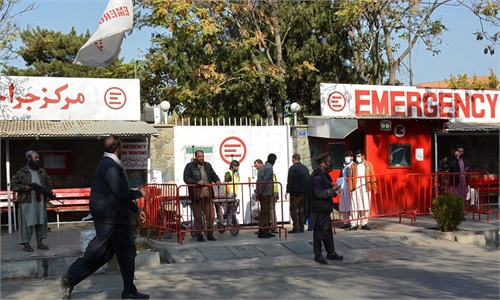Latest blasts in Kabul deepen concerns over security; Taliban govt urged to take stronger measures in fighting terrorism

Afghan medical staff members move victims after a military hospital was hit by twin bombings in Afghanistan's capital Kabul on November 2, 2021. The first bomb exploded at the entrance of the Sardar Mohammad Daud Khan Hospital, the largest military hospital in Kabul. At least 15 people were killed and 34 were injured in the two explosions. Photo: Xinhua
Explosions at the biggest military hospital in Kabul, Afghanistan, which killed at least 25 people and injured more than 50 on Tuesday, deepened the international community's concerns over the security situation and stability in Afghanistan. Analysts urged the Afghan Taliban interim government to take stronger moves to crack down on terrorism before more extremists are stirred up and drive the war-torn country into a hotbed of terrorism and extremism.
The explosions hit the entrance of the 400-bed Sardar Mohammad Daud Khan hospital on Tuesday and were followed by an assault by Islamic State gunmen, all of whom were killed within 15 minutes, Taliban spokesperson Zabihullah Mujahid said, according to Reuters.
The Tuesday attacks were the latest in a series that have taken place in Afghanistan after the Afghan Taliban took power.
"Two of our Chinese employees who were installing solar energy equipment saw heavy smoke rising from the place 500 meters away from them, and they thought it was an attack on the US Embassy as the military hospital is located across the street," Yu Minghui, a Chinese businessman who is staying in Kabul, told the Global Times on Wednesday.
Yu said that the attack may have an influence on the Afghan Taliban interim government, as people may question whether it has the ability to restore security.
He noted that in recent months, the government has taken measures to hunt down terrorists hidden in the cities, but the outcome seems unsatisfactory. But it can be seen that the Afghan Taliban is changing, and that it has tried to implement more inclusive policies.
An Afghan local working for an international organization based in Kabul told the Global Times that things have gone back to normal and local residents are getting used to the Taliban government.
But future is still hard to predict, as terrorist attacks are growing both in number and scale. The latest attack has shocked not only residents of Kabul but also the Afghan Taliban. It is hard to say if the Taliban will have the ability to counter these terrorists.
He noted that a food crisis and financial problems persist, especially as winter is coming. "Even if we get through this winter, what about the next? So the future is still hard to predict."
Abasin, a local resident, told the Global Times that people already had deep concerns about the rising threats of IS, as it has been making trouble not only for Shiite Muslim minorities but civil society, journalists, government employees and many other factions of society. It has targeted schools, educational centers, hospitals and many other institutions in the past couple of years.
Abasin said that the looming economic crisis, unemployment, lack of cash and the humanitarian catastrophe are the other major concerns Afghans are facing, and the upcoming winter seems to be more frightening for millions of them.
Since announcing the establishment of an interim government, the Afghan Taliban has been under great pressure to restore domestic stability, rebuild the economy and seek recognition from the international community. The recent terror attacks, conducted by the IS, mean more difficulties for the Taliban, Liu Zhongmin, a professor at the Middle East Studies Institute of the Shanghai International Studies University, told the Global Times.
The IS in Afghanistan has seen the Taliban's peace treaty with the US as a betrayal of jihad. It has conducted an array of terror attacks in Afghanistan, from the deadly blasts at the Kabul airport during the US' withdrawal to the Tuesday attack on the hospital.
The Tuesday blasts showed that IS has expanded its attacks from Shiites to a wider range, which may sow discord and distrust between the Afghan Taliban and different ethnic groups, and the latter may question the Taliban government's ability and sincerity in protecting them, Liu said.
The international community, which has been taking a wait-and-see attitude on the interim government, may also question the Afghan Taliban's ability to honor its promises of fighting terrorism. Moreover, continuous terror attacks will hinder the country's rebuilding and deter foreign investors, Liu noted.
Experts urged the Taliban interim government to take stronger measures in fighting against terrorism before more extremists are stirred up or encouraged by the IS to join it, which may turn the war-torn country into a hotbed of terrorism and extremism.



